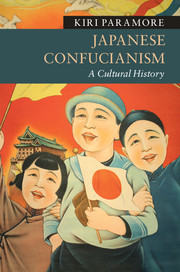Book contents
- Frontmatter
- Epigraph
- Contents
- List of figures
- List of maps
- Acknowledgments
- Notes on the text
- Timeline
- Maps
- Introduction
- 1 Confucianism as cultural capital (mid-first millennium CE–late sixteenth century CE)
- 2 Confucianism as religion (1580s–1720s)
- 3 Confucianism as public sphere (1720s–1868)
- 4 Confucianism as knowledge (1400s–1800s)
- 5 Confucianism as liberalism (1850s–1890s)
- 6 Confucianism as fascism (1868–1945)
- 7 Confucianism as taboo (1945–2015)
- Epilogue: China and Japan: East Asian modernities and Confucian revivals compared
- Notes
- Works Cited
- Index
Introduction
Published online by Cambridge University Press: 05 April 2016
- Frontmatter
- Epigraph
- Contents
- List of figures
- List of maps
- Acknowledgments
- Notes on the text
- Timeline
- Maps
- Introduction
- 1 Confucianism as cultural capital (mid-first millennium CE–late sixteenth century CE)
- 2 Confucianism as religion (1580s–1720s)
- 3 Confucianism as public sphere (1720s–1868)
- 4 Confucianism as knowledge (1400s–1800s)
- 5 Confucianism as liberalism (1850s–1890s)
- 6 Confucianism as fascism (1868–1945)
- 7 Confucianism as taboo (1945–2015)
- Epilogue: China and Japan: East Asian modernities and Confucian revivals compared
- Notes
- Works Cited
- Index
Summary
Be they pro-Japanese or anti-Japanese, be attentive to everything in their words, deeds, public and private lives. Do not forget the words [from the Confucian Classic, the Zuozhuan Commentary of the Spring and Autumn Annals]: “If he is not of our race, then he will of necessity be of a different heart.”
Alleged entry referring to Chinese and Manchus in the service handbook of a Japanese official working in the office of Zhang Jinghui, Prime Minister of Manchukuo, 1935–45 (Fogel and Yamamuro 2007: 11)The cover of this book represents a modern Confucian paradise: the state of Manchukuo (1932–1945). Established by Japan in occupied Northeastern China in the interbellum, it was billed as the apex of both East Asian Confucian tradition and industrial high modernity. The population, made up of Chinese, Koreans, Manchus, Mongolians, and Japanese, lived happily together in this multi-ethnic and multicultural state. Trans-Asian Confucian principles of benevolence and righteousness reigned under a “Kingly Way” of morally virtuous governance led by a paternal sovereign, the Manchu Emperor Pu Yi, aided by his good friend and kingly brother the Japanese Emperor Hirohito. Nations lived happily together, ethnicities united in the nation, tradition and modernity perfectly harmonized through a conservative and indigenous trans-Asian ethic of Confucianism, striving toward the material welfare that only high modernity could offer. This was the Confucian dream.
Of course, it was a lie. Manchukuo was a regime where strict rules of racial discrimination and subjugation, covering everything from bus seats to wages, created a pyramid-like hierarchy, with ethnic Japanese at the top, followed by Manchus and Koreans, and at the bottom the vast majority of Chinese. Life for most of the Chinese majority in this Confucian paradise was at best hard and at worst hellish. They were regularly sacrificed in the thousands, through wages mandated at starvation levels, through lethal forced labor projects, and even occasionally, as in the famous Unit 731, as guinea pigs in biological warfare experiments. Manchukuo is probably one of the most negative examples of Confucianism in over 2000 years of history. It is certainly not representative of Confucian history nor of modern Japanese history, nor of the long history of Japanese Confucianism. Nonetheless, it is one real example of a Confucian history.
- Type
- Chapter
- Information
- Japanese ConfucianismA Cultural History, pp. 1 - 15Publisher: Cambridge University PressPrint publication year: 2016



